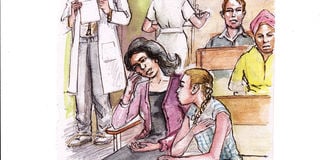Medico-legal grounds for abortion

In 1938, five officers (soldiers) of the Royal Horse Guards in England enticed a 14-year-old girl into their London barracks with a promise to show her a horse with a green tail. In the barracks, the five soldiers took turns to rape the girl and she became pregnant as a result.
Her parents took her to St. Thomas’s Hospital requesting for an abortion. The consultant at the hospital declined the request on grounds that the rapists were officers and apparently gentlemen and the girl therefore could ‘be carrying a future prime minister of England’. And the Consultant also stated that ‘girls always lead men on’.
The girl was then taken to St. Mary’s Hospital, another hospital in London, and was referred to see the consultant Dr Aleck Bourne, an eminent medical practitioner. He carefully considered the case noting that the girl was not mentally defective and not of the prostitute type. Bourne concluded that, though a plea of danger to life could not be substantiated, termination of the pregnancy was justified because of the risks to her physical and mental health.
On June 14, 1938, Bourne openly terminated the girl’s pregnancy by performing a surgical curettage (cleaning the uterus) and then deliberately informed the police. In his own words he stated: “I decided to bring forward a test case in which there would be no real danger to life…but in which one might strongly suspect great danger to health. I was also concerned to establish in the eyes of the Law that mental health was just as important as physical health, and in certain cases perhaps even more.”
Illegality
In England abortion was prohibited under the Offences Against the Person Act of 1861 and prosecutions for abortion were relatively common. Most of the people who were prosecuted under this act were women with no or little medical training, the so-called backstreet abortionists. Dr Bourne was charged under this Act.
His defence lawyers called several of his colleagues who testified that there were significant risks of both physical and psychological damage if the pregnancy had continued. In his defence, Dr Bourne told court that he could not draw a line between danger to life and danger to health; if one waited for danger to life the woman would be past assistance.
The Judge took the view that if there was unlawful abortion, then there should be situations in which abortion was lawful. He extended the meaning of the life of a woman to include her health and in guiding the jury he stated that: “if the doctor is of the opinion on reasonable grounds that the probable consequences will be to make the woman a physical and mental wreck, the doctor is operating for the purpose of preserving the life of the mother.” Dr Bourne was acquitted.
One week after his acquittal, he wrote: “The Attorney General admitted that abortion is legally recognised when life is in danger. Now we know it is also admitted when there is serious danger to health….the majority of the profession would feel they are on safer ground if the precedent established were incorporated in a new Act passed in days when much more knowledge of medicine and surgery and psychology is available than when the law was passed in 1861.”
Call for amendment
Another writer called for the law to be amended in an open and straight forward way to meet the demands of justice and humanity. Indeed in many jurisdictions the law has now been amended allowing doctors to undertake therapeutic abortions when they honestly believe the woman’s health is at risk if the pregnancy is allowed to continue. Abortion laws have now been amended to allow doctors to undertake therapeutic abortions when they honestly believe the woman’s health is at risk if the pregnancy is allowed to continue.
The Abortion Act 1967 of the United Kingdom for example allows induced abortion when continuing the pregnancy poses a greater risk to the life or physical or mental health of the woman, or her existing family or children, than if the abortion is carried out.
Dr Bourne was, however, opposed to this Act. He campaigned for the society for the protection of the unborn child, believing the new legislation to be too liberal. In his memoirs, Dr Bourne wrote:
“Those who plead for an extensive relaxation of the law against abortion have no idea of the very many cases where a woman, during the first three months, makes a most impassioned appeal for her pregnancy to be ‘finished’, later, when the baby is born, is thankful indeed that it was not killed while still an embryo.
During my long years in practice I have had many a letter of the deepest gratitude for refusing to accede to an early appeal.”
In another landmark ruling, a Judge stated that abortion would be unlawful if the person performing the abortion did not honestly believe on reasonable grounds that the abortion was necessary to preserve the woman from serious danger to her life or physical or mental health, or if the person did not honestly believe that in the circumstances the abortion was in proportion to the danger averted.
[email protected]



